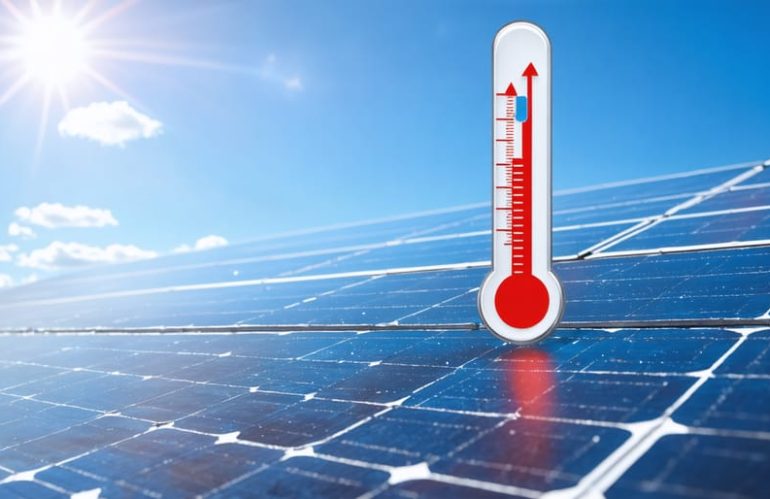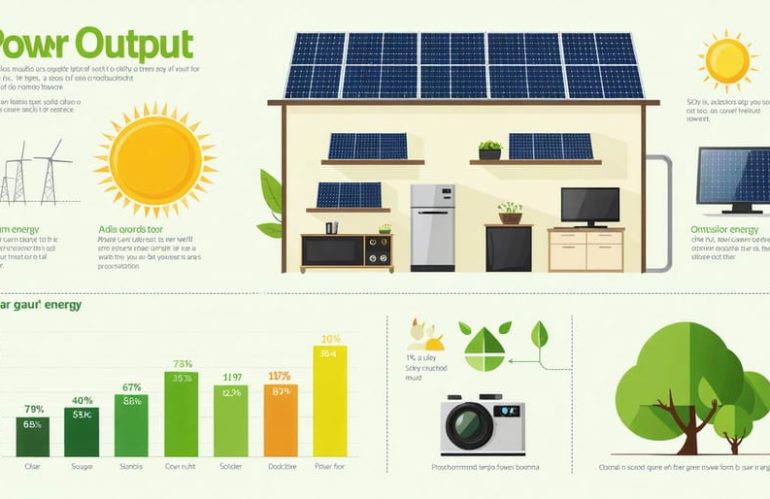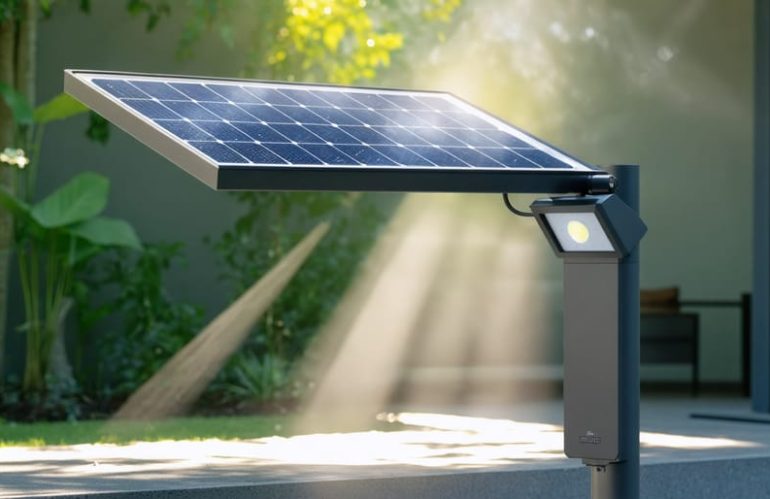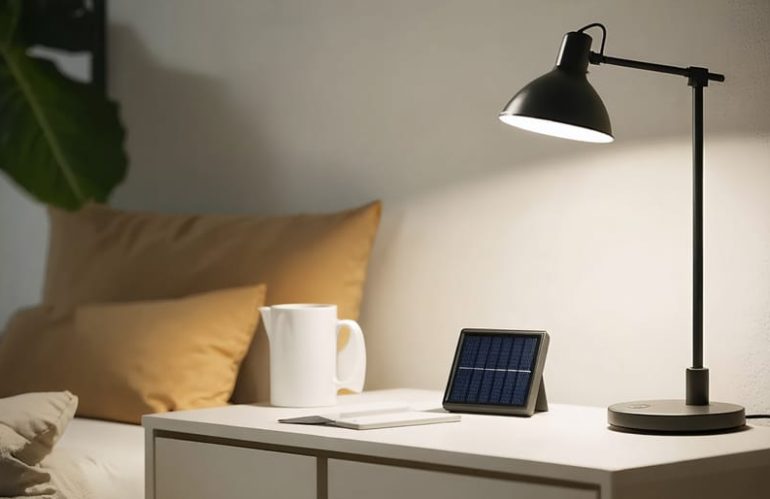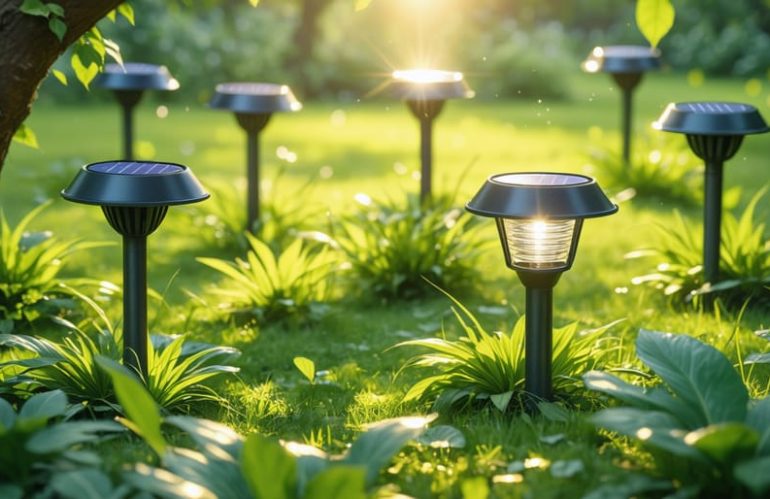Imagine a home so efficient it produces as much energy as it consumes – this is the revolutionary promise of zero energy ready homes. As energy costs continue to soar and climate concerns mount, these cutting-edge houses represent the future of sustainable living, combining advanced building techniques with smart design to slash utility bills while maximizing comfort.
Zero energy ready homes are built to exceptional standards of energy efficiency, featuring superior insulation, airtight construction, and high-performance windows and doors. What sets them apart is their ability to offset nearly all annual energy consumption …
Category: Technical Specifications and Performance
Technical details, performance metrics, and system specifications
How Temperature Affects Your Solar Panel Output (With Performance Chart)
Temperature plays a pivotal role in your solar panel’s performance, directly impacting your energy savings and return on investment. While solar panels harness sunlight efficiently, their power output typically decreases by 0.3% to 0.5% for every degree Celsius increase above optimal operating temperatures (25°C/77°F). Understanding this temperature-efficiency relationship helps homeowners make informed decisions about panel placement, maintenance, and performance expectations throughout the year.
A solar panel temperature efficiency chart reveals crucial insights: peak performance occurs during cool, sunny days, while …
Make Your Home a Solar Powerhouse: Smart Energy Upgrades That Pay Off
Transform your home into an energy-efficient powerhouse while helping to maximize your solar power performance. Smart energy upgrades not only reduce your monthly bills but can increase your home’s value by up to 10%. From enhanced insulation to smart thermostats, these ten home improvements work together to create a comprehensive energy-saving system that pays for itself over time.
The average American household wastes 35% of its energy through inefficient systems and …
Solar Panel Power Output: What Your Home Really Gets Per Square Foot
Understanding solar panel output is crucial for making smart energy decisions. A typical solar panel generates between 1.3 to 1.6 kilowatt-hours (kWh) per square foot annually, though actual production varies significantly based on location, installation angle, and environmental conditions. This efficiency translates to approximately 15-18 watts per square foot under ideal conditions.
For homeowners considering solar installation, these numbers mean a 100-square-foot array could generate 130-160 kWh annually in optimal conditions. Modern residential solar panels are becoming increasingly efficient, with some premium models now …
Solar Panel Efficiency Ratings: What They Really Mean for Your Home
Solar panel efficiency holds the key to maximizing your renewable energy investment, determining how effectively your panels convert sunlight into usable electricity. While most residential solar panels operate at 15-20% efficiency, understanding these measurements helps smart homeowners make informed decisions about their energy systems. From laboratory testing conditions to real-world performance metrics, solar efficiency calculations reveal crucial insights about panel quality, potential energy production, and ultimate cost savings. Whether you’re considering a solar installation or optimizing an existing system, grasping how …
Make Your Solar Lights Last Longer: Smart Charging with On/Off Switches
Maximize your solar lights’ performance with proper charging techniques that extend battery life and enhance illumination. Solar lights with on/off switches offer greater control over your outdoor lighting, but they require specific charging methods to function optimally. Whether you’re new to solar lighting or looking to improve your existing setup, understanding the correct charging process ensures reliable nighttime illumination while saving energy. This guide walks you through proven charging strategies that work for all seasons, helping you maintain bright, consistent lighting without increasing your energy bills.
…
Smart Ways to Boost Your Solar Panel Performance (And Save More Money)
Maximize your home’s solar energy production by strategically positioning most efficient solar panels at a 30-45 degree angle, facing true south in the Northern Hemisphere. Modern residential solar systems convert up to 23% of sunlight into electricity, translating to significant savings on monthly energy bills. Regular maintenance, including quarterly cleaning and annual professional inspections, keeps conversion rates at peak performance while extending system lifespan…
Solar Energy Audit: Maximize Your Home’s Solar Power Performance
A solar energy audit unlocks the full potential of your home’s solar investment, revealing hidden opportunities to maximize both energy production and cost savings. Unlike traditional energy audits, these specialized assessments examine your property’s solar capabilities, current energy consumption patterns, and untapped renewable energy possibilities. By combining advanced monitoring technology with expert analysis, a solar energy audit provides a comprehensive roadmap for optimizing your solar system’s performance or making informed decisions about new installations.
Think of it as a health check-up for your home…
How to Power Your Solar Lights When There’s No Sun (Simple Indoor Methods)
Power up your solar lights even during cloudy seasons using proven indoor charging alternatives. While sunlight remains the most efficient charging method, several effective options ensure your solar-powered fixtures stay bright when natural light is scarce. Position solar panels under bright LED or fluorescent lights, maintaining a 12-inch distance to simulate sunlight’s intensity. Alternatively, use a standard household light bulb (60-100 watts) positioned 20 inches from the panel for 8-10 hours to achieve a meaningful charge. For optimal results, clean the solar panels thoroughly before indoor charging and ensure they’re …
Effortlessly Charge Your Solar Lights in 5 Simple Steps
Position your solar lights in an area that receives direct sunlight for at least 6-8 hours per day. Flip the on/off switch to the “on” position to enable proper charging. Ensure the solar panel is clean and free of debris to maximize energy absorption. Allow the solar lights to charge for a full day before expecting optimal nighttime performance.
Step 1: Locate the On/Off Switch
To begin charging your solar lights, you’ll first need to locate the on/off switch. This switch is typically found on…


